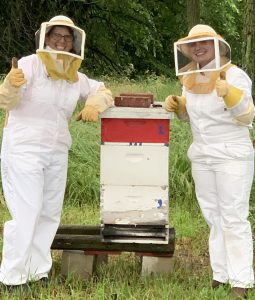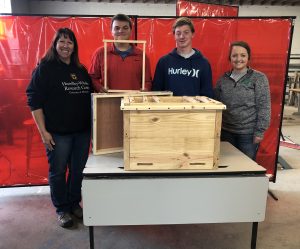This story also appears in our University of Missouri College of Agriculture, Food and Natural Resources’ Agricultural Research Center Magazine. Stop by your local Research Center to pick up a copy! You can view the magazine online by clicking here: Road to Discovery.
Due to its location on second bottom river soils, the Hundley-Whaley Research Center provides an optimum location for agronomic studies including testing and comparison of new varieties and new products.
Jennifer Miller has looked for ways to build on those projects since she was named the superintendent of the Research Center in 2018. Her focus has been on small-acre entrepreneurship plots that are around five to 30 acres. After asking for feedback and doing her own research, Miller chose honeybees as a topic of interest.

entrepreneurship plots that are around five to 30 acres. Miller is pictured with Haleigh Karl, an intern at the Research Center.
“We have a lot of farmers in the area who have five to 30 acres of land and are looking to do something with it,” Miller said. “They want to make a little money off of it and use it wisely. I’ve found out that there is definitely a need for research for these smaller-acre farms.
“The honeybees seemed like a natural choice with the Center’s focus on pollinators. I found out that pollinators are on the younger generation’s mind as well. During our annual agriculture science day, I found out that several of our local high school students are doing FFA projects with honeybees. I thought this could be an opportunity to get ahead of the research instead of being reactive.”
The Hundley-Whaley Research Center has three honeybee boxes with the goal of expanding that number in the future. The Center features two traditional stacked boxes and one horizontal box, fashioned after Leo Sharashkin’s design. Sharashkin, who earned his Ph.D. in forestry from Mizzou, founded HorizontalHive.com and has devoted his career to keeping bees naturally in horizontal hives.
“Leo spoke at one of our Field Days, so we thought it was important to include a box related to his design,” Miller said. “The horizontal box is a continuation of his talk.
“We bought the two stacked boxes from a local farmer. He has several projects that he’s trying, so it was great to pick his brain and see what has been working for him.”
Miller is interested in a variety of information within the project. Along with providing a place for pollinators to recharge, she is going to research honey production, bee
livelihood and box preference, among other projects.
“We’ve had a half acre of pollinator habitat for a couple years now, but that’s been strictly for demonstration purposes,” Miller said. “We’ve been able to educate the public but, until now, we haven’t performed pollinator research. This is our opportunity to do direct research.”
Miller got an introduction to beekeeping by Raymond Heldenbrand, a beekeeper and retired MU Extension specialist. Heldenbrand built two swarm boxes and donated them to Hundley-Whaley. The swarm boxes are used to catch bees native to Gentry County. Miller will then transfer those swarms to the Research Center.
“He’s been such an asset for me as I get started – and he’s just a great person,” Miller said. “He allowed me to go out and look at his hives and get an idea of what I was going to be doing.”

Heldenbrand shared some of the problems he’s dealt with as a beekeeper, such as mites and moisture. While moisture is tougher to deal with, Miller is going to try a couple different approaches to handling mites.
Miller worked with the Albany High School FFA chapter to build the horizontal hive.
“Their woodworking class put it together,” Miller said. “There are two specific students who will build us more boxes if need be as well. Those students will talk about their experiences during our Twilight Tour and ag education day, too. They will share their experiences with the project and why it’s important to focus on pollinators.”
Miller is focused on getting the local community involved in research, from elementary school students to experienced farmers. She will also eventually look for funding opportunities to grow the research even more.
“It’s incredibly important to me to engage both children and adults,” Miller said. “I want them to get hands-on experience and get excited about the research, as well as involved in what we’re doing at the Hundley-Whaley Research Center.”